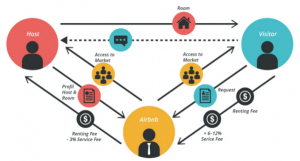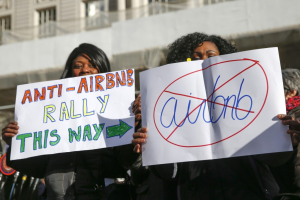Airbnb, a platform business
With the evolving digital technologies and growing environmental awareness, platform businesses have been rising globally. Airbnb as a successful platform business operates in over 220 countries and regions (Iproperty management, 2021). This paper is a case study of Airbnb in terms of its establishment, major business, success, revenue stream, and profitability and the concerns and controversies it aroused.
When Airbnb was founded
John (2008) illustrates that human beings have been sharing while digital technologies significantly boosted sharing. Mansell and Steinmueller (2020) agree that new technologies drive economic growth in neoclassical economic perspective. In alignment with above arguments, the creation of Airbnb was pushed by digital technologies. The company was founded in August 2008 in San Francisco, California. Brian Chesky and Joe Gebbia started with the idea of putting an air mattress in their living room and transforming it into a bed and breakfast. In 2008, they found a website providing short-term living and breakfast services to those who were unable to book a hotel room. In 2009, the company gained 20,000 USD venture investment from Y Combinator and rebranded its name as Airbnb.

Figure 1:“Breakfast with Brian Chesky” by Kevin Krejci is licensed under CC BY 2.0
Major businesses
Van Dijck et al. (2018) observe that platform businesses have been building their ecosystem to sufficiently collect, analyse and apply user data as well as strongly control core services in many markets by their diversification strategies, acquisition, and collaboration. Airbnb’s business is online lodging, mainly homestays for vacation rentals and tourism accommodations. It does not own any properties but act the role of an online agency between a host and a visitor (see Figure 2). In alignment with the argument of Van Dijck et al. (2018), the company currently is planning to use its partnership with Apple, Inc., Amazon, and Google to develop smart home businesses (Skift, 2021).

Figure 2: Airbnb’s business model (Source from: BM Tool Box, 2021)
The success of Airbnb
Airbnb rose a $100 billion Initial Public Offering (IPO), has more than 4 million hosts, and operations in 100,000 cities (Iproperty management, 2021). Its business is beneficial for both hosts and guests. Its average host earns US$ 9,600 a year and its guests has booked more than 900 million stays (Iproperty management, 2021).
The success of Airbnb is associated with its internal and external environment. To begin with external environment, younger generations especially millennials and Generation Z have preference to sharing economy because they are digital natives, cost-sensitive and have greater environmental awareness (Guttentag, 2019). Zervas et al. (2017) also agree that many customers consider Airbnb as cost effective and environment friendly and the society accepts and appreciates the benefits of sharing economy. For Airbnb’s internal management, the company has a very low operating costs and fixed costs against its hotel competitors. More importantly, it has strong flexibility to address the changes in market demands. It has the capability to largely supply rooms in peak seasons and reduce its supplies in off seasons because it does not own any properties (Oskam & Boswijk, 2015 and Zervas et al., 2017). Furthermore, Mansell & Steinmueller (2020) argue that scale economies strongly impact a platform’s cost structure and its capability to dominate a market. Airbnb, as mentioned, has a large scale of economies. It was estimated that Airbnb accounted for over 20% of the vacation rental industry (Hospitable, 2020). With such huge scale of economies, it can strongly control costs against traditional hotel industry.

Figure 3, (Source from: Skift, 2020)
Revenue stream and profitability
The major revenue streams of Airbnb include marketing and maintenance. It charges hosts marketing costs to promote their properties. Airbnb’s profitability however is questionable. Between 2017 and 2020, it only earned US$ 1.87 million in 2018 and lost US$ 359.01 million in 2020 and US$ 317.97 million in 2021 (SEC, 2021). Van Dijck et al. (2018) argue that large platform businesses engage diversified businesses to fully take advantage of user’s data and build ecosystems to control critical nodes of information services. However, Airbnb barely has any ecosystem before 2021, which can explain its low profitability.
Major concerns and controversies
The rise of Airbnb has aroused many concerns and controversies. Firstly, Van Dijck et al. (2018) argue that Airbnb does not need to obey strict regulations and laws whereas hotels are strictly licensed in terms of safety issues and make contributions to taxes. Airbnb merely connects hosts and guests. This aroused the safety and tax issues of Airbnb. Even though Airbnb reported below 0.1% of 200 million bookings leading to a reported safety issue (Carville, 2021), some reports reveal that the company has serious security issues based on the analysis of negative reviews of guests (Agerholm, 2017). Hosts can adopt fake information to pass Airbnb’s background checks. Other safety issues include theft, infringement of privacy, rape, and murder (Agerholm, 2017).
Secondly, Airbnb collected huge amount of customers’ private data, whereas data security and data usage are ethical challenging issues (Van Dijck et al., 2018). Rad et al. (2016) argue that the society is highly concerned about how tech giants protect and use their data, and afraid of misconduct of their personal data. In the age of big data analytic, whether users or companies own the data is debatable (Toshniwal et al., 2015). More importantly, governments lack sufficient laws and regulations to protect users’ privacy in the age of big data and artificial intelligence (Toshniwal et al., 2015). Ethical issues of Airbnb’s data management and protection are arguable (Oskam & Boswijk, 2015).
Thirdly, Airbnb with over 20% market share of the vacation rental industry is dominating the industry. It also is the leading company in in the segment of accommodation platforms. However, Mansell and Steinmueller (2020) argue that the large digital platforms with huge scale of economies can become monopolists. In a monopolistic market, competitions are imperfect and tend to hurt customer’s interests (Bykadorov et al., 2014). Van Dijck et al. (2018) also agree that the rise of dominant platforms cause imperfect competitions by hindering new entrants. Existing players such as Airbnb can build huge barriers to new entrants. Without sufficient competition, customers are more vulnerable.
The rise of sharing economy has leaded to many social issues as it brought many social changes (Hira & Reilly, 2017). Airbnb as a less regulated company has criticised for rising the house prices. Its existence helps hosts easily enter accommodation markets and thus houses can become their revenue streams. Barron et al. (2014) found empirical evidence showing a positive relationship between Airbnb and houses as well as rental prices. Every 10% increase in Airbnb listings can result in a 0.42% growth in rents and a 0.76% growth in house prices. Also, Holder (2019) found that every 12 Airbnb listings increases rent in a district by 0.4%. Furthermore, Airbnb was founded involving in discrimination issues (Bhattarai, 2016). Hosts are less willing to rent their houses to Africa Americans in the US. In China, hosts showed discrimination against Uyghurs. Even though the company started to experiment blacking guests’ profile photos, hosts can still speculate a guest’s ethnics by his or her name. Generally, Airbnb is criticised for negatively affecting housing affordability and overlooking discriminations.

Figure 4, (source from: PBS, 2016)
How about the future?
This paper has summarised the growth and current statue quo of Airbnb. The company’s rise can be explained by the sharing nature in human and the evolution of digital technologies. Airbnb’s business is online lodging, mainly homestays for vacation rentals and tourism accommodations, which acts the role as an online agency between a host and a visitor. The company has a large scale of economy while is unprofitable. It has not built a business ecosystem to full take advantage of users’ data. Airbnb has aroused many concerns and controversies including safety issues, privacy and data issues, as well as its impacts on market structure, housing affordability and racism. Based on above analysis, it is safe to argue the importance of properly regulating Airbnb especially in terms of safety, customer interest, tax and its social impacts.
Reference
Agerholm, H. (2017). Airbnb accused of failing to close ‘dangerous loopholes’ after guest finds corpse in garden. Retrieved from https://www.independent.co.uk/news/uk/home-news/airbnb-dangerous-loopholes-corpse-garden-a8101371.html
Barron, K., Kung, E. & Proserpio, D. (2017). “The Sharing Economy and Housing Affordability: Evidence from Airbnb”. SSRN 3006832.
Bhattarai, A. (2016). Airbnb hires Eric Holder to help company fight discrimination. Retrieved from: https://www.washingtonpost.com/news/business/wp/2016/07/20/eric-holder-joins-airbnb-to-help-company-fight-discrimination/
BM Tool Box (2021). Airbnb. Retrieved from https://bmtoolbox.net/stories/airbnb/.
Bykadorov, I.A., Kokovin, S.G. & Zhelobod’ko, E.V. (2014). Product diversity in a vertical distribution channel under monopolistic competition. Autom Remote Control 75, 1503–1524
Carville, O. (2021). Airbnb Is Spending Millions of Dollars to Make Nightmares Go Away. Retrieved from: https://www.bloomberg.com/news/features/2021-06-15/airbnb-spends-millions-making-nightmares-at-live-anywhere-rentals-go-away
CNBC (2014). Brian Chesky and Joe Gebbia. Retrieved from: https://www.cnbc.com/2014/10/06/brian-chesky-and-joe-gebbia.html
Iproperty management (2021). Airbnb Statistics. Retrieved from: https://ipropertymanagement.com/research/airbnb-statistics
Guttentag, D. (2019). Progress on Airbnb: a literature review. Journal of Hospitality and Tourism Technology, 10(1).
Hira, A. & Reilly, K. (2017). The Emergence of the Sharing Economy: Implications for Development. Journal of Developing Societies, 33(5).
Holder, S. (2019). The Airbnb Effect: It’s Not Just Rising Home Prices. Retrieved from https://www.bloomberg.com/news/articles/2019-02-01/airbnb-increases-home-prices-yet-escapes-regulation
Hospitable (2020). Competitors For Airbnb: Who’s Stealing Market Share From The Industry Giant? Retrieved from: https://hospitable.com/competitors-for-airbnb/
John, N. A. (2018). Sharing Economies. In The Age of Sharing. Cambridge: Polity. pp. 69-97.
Mansell, R. & Steinmueller, W. E. (2020). Advanced Introduction to Platform Economics. Cheltenham, Edward Elgar, pp. 35-54.
Oskam, J. & Boswijk, A. (2015). Airbnb: The future of networked hospitality businesses. Journal of Tourism Futures, 2(1), 22-42.
PBS (2016). Airbnb enlists Eric Holder to address racial discrimination. Retrieved from: https://www.pbs.org/newshour/nation/complaints-racial-discrimination-airbnb-hires-eric-holder
Van Dijck, J., Poell, T. & de Waal, M. (2018). The Platform Society. Oxford: Oxford University Press, pp. 5-32.
Rad, B. B., Akbarzadeh, N. & Ataei, P. (2016). Security and Privacy Challenges in Big Data Era. International Journal of Control Theory and Applications, 9(43):437-448.
Rollet, C. (2019). Airbnb listings in China are littered with racist discrimination. Retrieved from: https://www.wired.co.uk/article/airbnb-china-uyghur-muslim
SEC (2021). Airbnb, Inc. Retrieved from: https://finance.yahoo.com/quote/ABNB/financials/
Skift, S. D. (2021). Airbnb Sees Opportunities in Smart Homes in Partnerships with Apple, Amazon, and Google. Retrieved from: https://skift.com/2021/06/17/airbnb-sees-opportunities-in-smart-homes-partnered-with-apple-amazon-and-google/
Skift, R. H. (2020). Travel Megatrends 2025: Asia Bulks Up Even as it Looks Inward. Retrieved from: https://skift.com/2021/02/01/travel-megatrends-2025-asia-bulks-up-even-as-it-looks-inward/
Toshniwal, R., Dastidar, G. K. & Nath, A. (2015). Big Data Security Issues and Challenges. International Journal of Innovative Research in Advanced Engineering, 2(2), 15-20.
Zervas, G., Proseripio, D. & Byers, J. (2017). The Rise of the Sharing Economy: Estimating the Impact of Airbnb on the Hotel Industry. Journal of Marketing Research, 5(5), 687-705.
Yishan Zhao’s assignment2